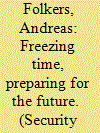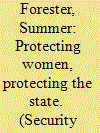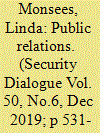|
|
|
Sort Order |
|
|
|
Items / Page
|
|
|
|
|
|
|
| Srl | Item |
| 1 |
ID:
170758


|
|
|
|
|
| Summary/Abstract |
This article analyses stockpiling as a security device that hoards time, stores power and buffers disruptions. The stockpile is a temporal matter of security by virtue of its ability to freeze time and to prepare for future emergencies. Stockpiling is informed by anticipations of threats but also materially underpins expectations. After unpacking the temporal ontology of stockpiling, the article traces its history as a security device and technology of power. Stockpiling enabled the emergence of the earliest states by establishing the means to store surpluses and centralize power. In modernity, stores became more dispersed as money, commodity exchange and new infrastructures made it possible to procure resources through circulation. In the 20th century, stockpiling became a reflexive security device reactive to risks associated with the disruption of these circulations. Finally, the article illuminates the role of reserves in contemporary German catastrophe preparedness to show that stockpiling remains an important security technique. Yet fiscal austerity and budgetary constraints limit security stockpiling. To compensate for the absence of public security stores, the government is prompting citizens to establish emergency stockpiles. The article offers a theoretical, historical and empirical engagement with stockpiling and thereby further elucidates the material politics of anticipation.
|
|
|
|
|
|
|
|
|
|
|
|
|
|
|
|
| 2 |
ID:
170759


|
|
|
|
|
| Summary/Abstract |
Nuclear governmentality is offered as a conceptual contribution to research on energy politics, security studies, and nuclearity. Nuclear governmentality is conceived as a logic of government in the Foucauldian sense, that describes contiguities in conduct and symbolic representations found across disparate dispositifs, especially (albeit not exclusively) those strategically aimed at eliciting and exploiting atomic forces in medicine, industry, and war. This project demonstrates the logic and technologies of power specific to nuclear governmentality in post-Fukushima Daiichi energy commitments, evacuation policies, risk assessments, and health surveillance programs. Nuclear governmentality is at once modern in its adaptation of regimes of risk management and anachronistic in its prioritization of sovereign decisionality in their developments and deployments, especially evident in the legal principle of the minimum standard and the instrument of the permissible dose.
|
|
|
|
|
|
|
|
|
|
|
|
|
|
|
|
| 3 |
ID:
170757


|
|
|
|
|
| Summary/Abstract |
Contrary to our understanding of when states act on women’s rights, Jordan adopted a policy on violence against women at the same time as it faced a number of external and internal security threats. In this article, I query the relationship between militarism and the gender policymaking process in Jordan to make sense of this puzzle. I specifically consider the ways in which a feminist conceptualization of militarism offers a more fruitful understanding of government action on violence against women in Jordan than studying this policy development through the lens of patriarchy, state institutions, and/or feminist activism alone. Indeed, evaluating the development of Jordan’s Family Protection Law through the lens of militarism and related security practices reveals the depth and breadth of these phenomena: the martial values and priorities of the Jordanian regime extend beyond the realm of traditional, ‘high politics’ security issues and impact civil, social, and even interpersonal relations – relations that are always already gendered – that are seemingly far removed from military concerns. I argue that the Jordanian government adopted its policy on violence against women because this enhanced the state’s image in the international arena and appeased domestic audiences by adhering to a gendered logic of protection that maintains the state as the ultimate protector of women. Overall, the article deepens our understanding of how militarism and the security climate influence the gender policymaking process, particularly in semi-authoritarian regimes.
|
|
|
|
|
|
|
|
|
|
|
|
|
|
|
|
| 4 |
ID:
170760


|
|
|
|
|
| Summary/Abstract |
This article contributes to the emerging literature on publics within critical security studies. Its particular focus is on contestation in the context of diffuse security technology. Contemporary security practices are characterized by diffusion and dispersion. As a result, contestation of security technology is also dispersed and diffuse and requires an account of publics that is sensitive to this aspect. The article conceptualizes ‘multiple publics’ as a mode of fundamental contestation of established political institutions. In order to do so, it discusses previous approaches to sociotechnical controversies and material participation. As a result of this discussion, it becomes apparent that we need a concept of publics that does not reduce political contestation to a pre-existing set of institutions. I develop a notion of publicness that emphasizes the way in which publics are embedded in societal struggles. This is achieved by reading John Dewey as a theorist to whom contestation is a vital part of democracy. It becomes possible to understand contestation against diffuse security practices – such as surveillance – as forms of emerging publics, even though they might not feed back into governmental decisionmaking.
|
|
|
|
|
|
|
|
|
|
|
|
|
|
|
|
| 5 |
ID:
170761


|
|
|
|
|
| Summary/Abstract |
By drawing on critical security studies in the context of a sociotechnical transition, this article calls for more attention to the presence and sometimes alternative use of mostly unobserved security practices in the materialization of everyday consumer goods and services. This call is illustrated through a discussion of the phenomenon of range anxiety and the intra-action between drivers of electric vehicles (EVs), designers, and algorithms that observe, estimate and nudge the remaining range of an EV. Inspired by Foucault and Barad, the range-anxiety discussion offers four alternative security insights. First, it supports an argument to include stress as an embodied instance of insecurity. Second, it draws attention to a security apparatus that is based on a constantly expanding assemblage around range estimates. Third, it shows how this apparatus rests on a novel algorithm that has a continuous instead of a binary output and is governed by a distributed sovereignty: where the driver simultaneously is the object of measurement, subject of governance for more efficient driving and the ultimate sovereign who decides on the trip. Lastly, the discussion highlights how range estimates not only mediate the materialization of EVs and their automobility but also (re)perform epistemological or ontological forms of uncertainty.
|
|
|
|
|
|
|
|
|
|
|
|
|
|
|
|
|
|
|
|
|